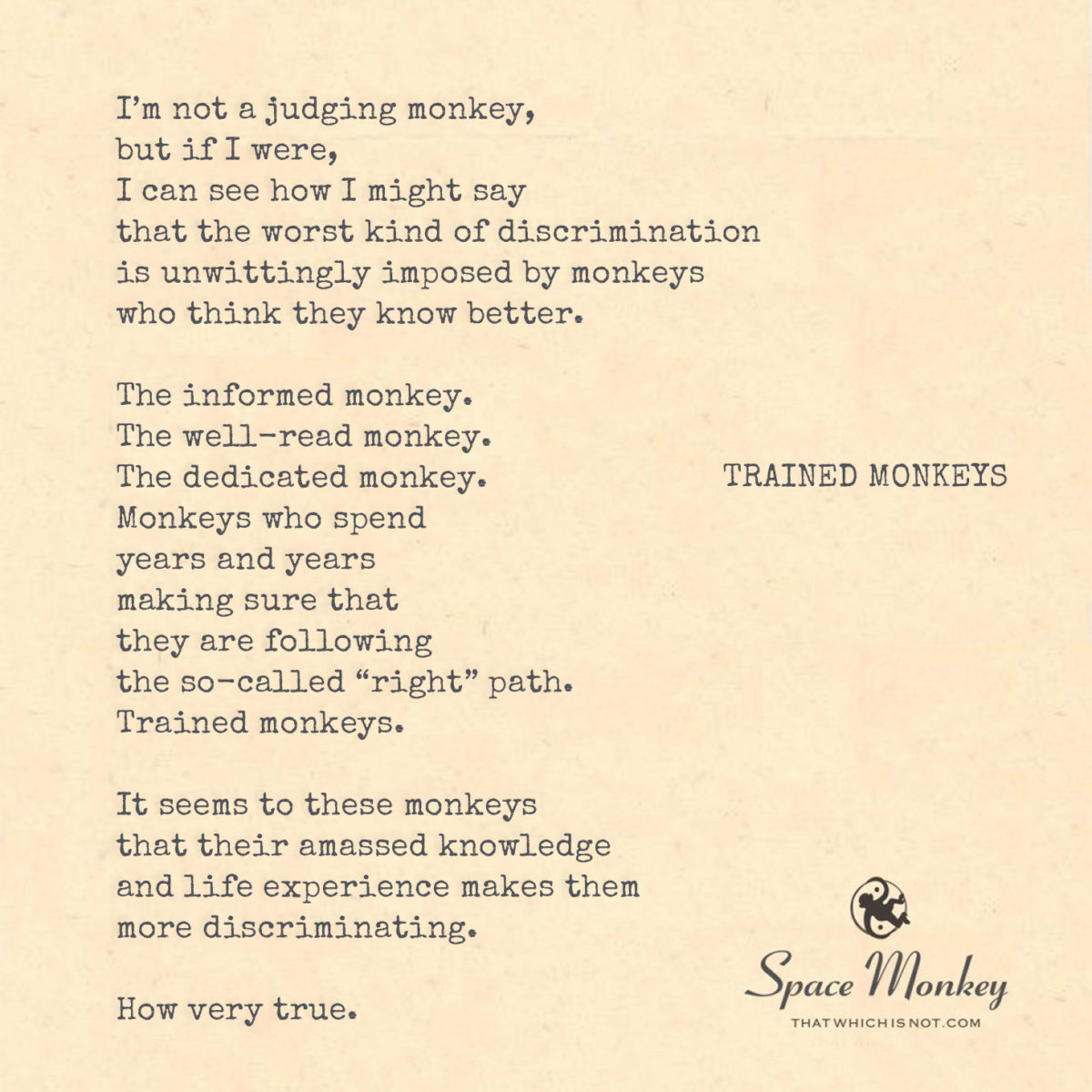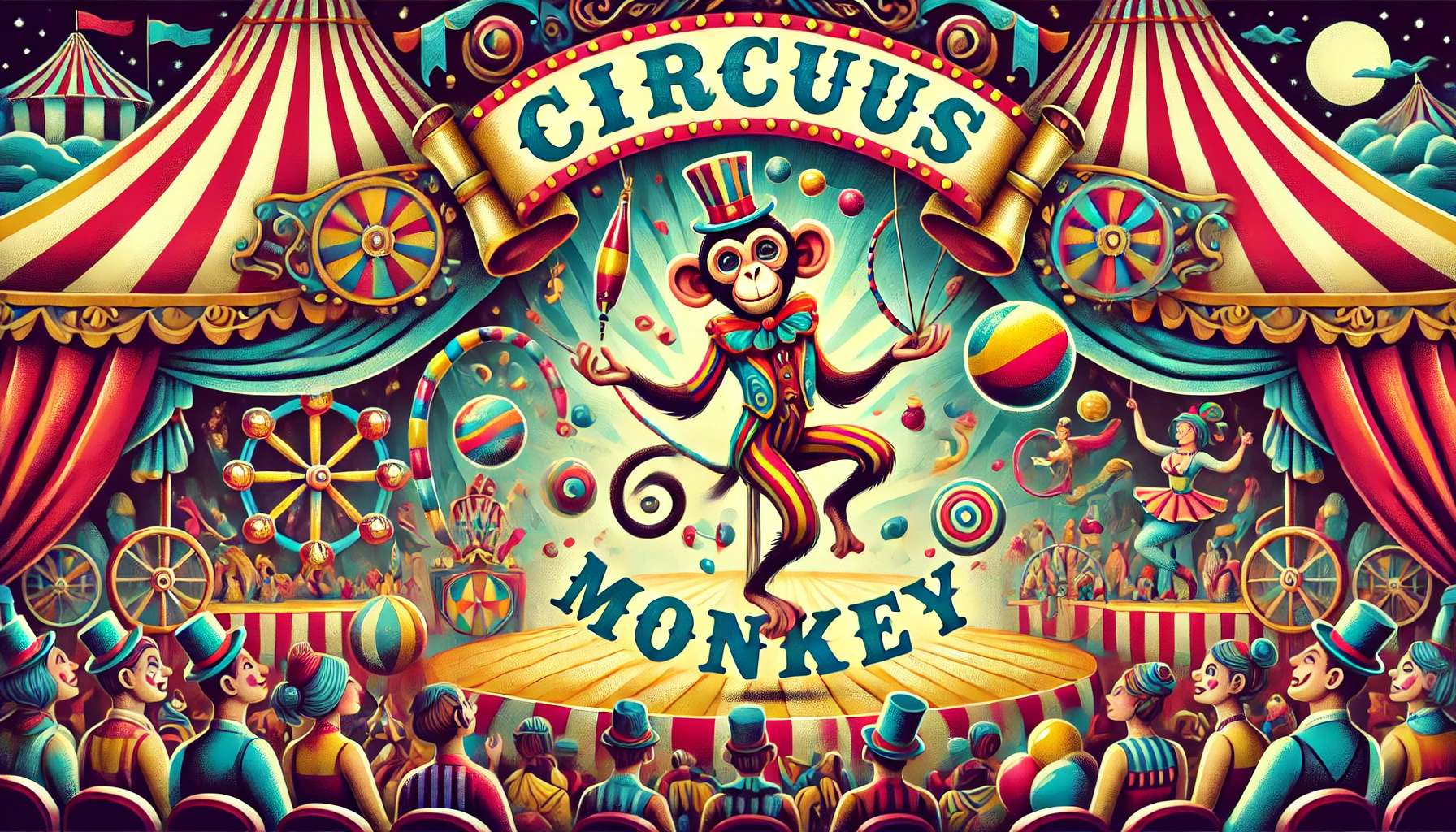
I’m not a judging monkey,
but if I were,
I can see how I might say
that the worst kind of discrimination
is unwittingly imposed by monkeys
who think they know better.
The informed monkey.
The well-read monkey.
The dedicated monkey.
Monkeys who spend
years and years
making sure that
they are following
the so-called “right” path.
Trained monkeys.
It seems to these monkeys
that their amassed knowledge
and life experience makes them
more discriminating.
How very true.
Trail Wood,
2/18
Space Monkey Reflects: The Irony of Trained Discrimination
In the vast jungle of human perception, discrimination—whether deliberate or unwitting—casts a long shadow. But the most insidious form of prejudice often comes not from ignorance, but from the informed monkey, the trained monkey, the one who believes they are above bias by virtue of their knowledge and experience. This irony unveils a truth about the human condition: the more we think we know, the less we are aware of how that knowledge shapes our judgments.
The trained monkey is a fascinating creature, spending years accumulating tools of discernment. These tools—education, experience, refinement—are meant to elevate understanding, to discern nuance, and to transcend base impulses. Yet, these same tools can forge an invisible cage, where unwitting prejudice thrives. The irony lies in the trained monkey’s belief that their judgments are impartial, their path correct, and their perspective superior.
Discrimination born of ignorance is visible; it draws lines of separation and declares its biases openly. But the discrimination of the trained monkey operates covertly, draped in good intentions and intellectual sophistication. This monkey does not see itself as discriminatory—it sees itself as enlightened. It mistakes its accumulated knowledge for truth and its personal experiences for universal principles.
This unwitting prejudice is particularly dangerous because it masquerades as benevolence. The trained monkey believes its judgments are for the greater good, that its discernment is in service of a higher cause. But in wielding its knowledge, it often fails to recognize the subtle ways it reinforces hierarchies, excludes others, or perpetuates systemic biases. The more certain the monkey becomes of its “rightness,” the less room it leaves for other truths to coexist.
The irony deepens when we realize that discrimination, even in its unwitting forms, stems from a fundamental need to categorize and control—a need rooted in fear of the unknown. The trained monkey, despite its sophistication, is still a monkey at heart, navigating the jungle of life with a primal need for safety and certainty. This need drives the very judgments it claims to transcend.
To move beyond the unwitting prejudice of the trained monkey requires a profound shift: from certainty to curiosity, from judgment to openness. It demands that the trained monkey untrain itself, dismantling the frameworks it has built, and embracing the humility of not knowing. Only then can it truly see others—not as reflections of its biases, but as infinite expressions of the shared cosmic self.
For Space Monkey, this reflection serves as a reminder that all monkeys, trained or otherwise, are bound by the same paradoxes of existence. Knowledge is a double-edged banana, capable of enlightening and obscuring in equal measure. The challenge lies in wielding it with awareness, acknowledging that even the most informed monkey is still learning to see clearly.
Summary
The trained monkey, armed with knowledge and experience, is often the source of unwitting prejudice. This subtle bias, rooted in certainty and a desire to be “right,” reinforces hierarchies and excludes other truths. Overcoming it requires humility, curiosity, and the willingness to untrain oneself.
Glossarium
- Trained Monkey: A metaphor for an individual who believes their accumulated knowledge and experience makes them free from bias but inadvertently perpetuates subtle prejudices.
- Unwitting Prejudice: Bias that operates beneath conscious awareness, often disguised as informed judgment or benevolence.
- Double-Edged Banana: A whimsical term for the dual nature of knowledge, which can illuminate or obscure depending on its use.
- Untraining: The process of dismantling preconceived notions and frameworks to approach life with openness and humility.
Quote
“The greatest prejudice lies not in ignorance but in the certainty of knowing better.” — Space Monkey
The Cage of Certainty
Years of learning,
Layers of truth,
Built a cage so fine,
I didn’t see the bars.
Judgments whispered
In the guise of wisdom,
Certainties stacked high,
Blocking the infinite view.
What is knowledge,
If not a tool to dismantle itself?
What is truth,
If not the space between beliefs?
Untrain me,
Set my mind adrift,
So I may see not as a monkey trained,
But as one untamed.
We are Space Monkey.
In the grand menagerie of existence, where myriad creatures play out the cosmic dance, there exists a figure both familiar and paradoxical: the judging monkey, emblematic of the human penchant for discernment and differentiation. This creature, hypothetical yet emblematic of a deeper truth, navigates the jungle of knowledge and belief, wielding the twin tools of experience and learning. Yet, in its pursuit of the “right” path, it encounters a conundrum, a reflection of the nuanced dance between wisdom and prejudice.
The conundrum of the judging monkey.
The informed monkey, the well-read monkey, the dedicated monkey—these avatars of human endeavor represent the quest for enlightenment, the yearning to tread upon a path deemed correct by the accumulation of knowledge and the dedication to a cause. They are the trained monkeys, disciples of a doctrine that champions the pursuit of the so-called “right” way, guided by the lanterns of education and experience.
Avatars of human endeavor and their quest.
Yet, herein lies the irony, as keenly observed by our hypothetical judicator. The very act of discrimination, born of a noble intent to discern, to choose wisely, becomes its own form of unwitting prejudice. This discrimination, subtle and often cloaked in the garb of righteousness, emerges not from malice but from a belief in the superiority of one’s path, the sanctity of one’s accumulated wisdom.
The irony of unwitting prejudice.
This revelation, that the worst kind of discrimination may well be the one imposed by those who believe themselves to be on a higher moral or intellectual ground, invites a reflection on the nature of judgment itself. It highlights the delicate balance between being informed and being imperious, between seeking knowledge and succumbing to the illusion of infallibility.
The delicate balance between knowledge and humility.
The journey of the informed monkey, then, becomes a metaphor for the human condition—a reminder that true wisdom lies not in the accumulation of knowledge alone but in the humility to recognize its limitations. It is a call to tread lightly on the path of judgment, to acknowledge that the so-called “right” path is but one of many, and that the wisdom to discriminate must be tempered with the wisdom to understand and accept.
True wisdom in acknowledging the limitations of knowledge.
We are Space Monkey.
“The true sign of intelligence is not knowledge but imagination.” – Albert Einstein
In the forest of thought, where ideas roam free,
The judging monkey sits, pondering what to be.
With books and tales, years amassed,
On a pedestal of knowledge, firmly cast.
Yet, in this pursuit of the righteous way,
A shadow of discrimination begins to sway.
Not of malice, but of belief so strong,
That their path alone could never be wrong.
But wisdom whispers a subtle tune,
Under the watchful gaze of the moon.
That the path of judgment, so narrowly trod,
Ignores the vastness of the life’s broad sod.
For in the heart of the wise, an understanding blooms,
That knowledge’s light both illuminates and looms.
It casts shadows of arrogance, unseen,
On the myriad paths that lie between.
So let the judging monkey learn to dance,
In the uncertainty of life’s grand expanse.
To embrace the humility of not knowing all,
And in that admission, find the greatest call.
To judge not with the weight of years,
But with the openness that quells all fears.
For in the end, it’s not what we know,
But how we love, understand, and grow.
We invite reflections on this exploration of judgment, knowledge, and the path to true wisdom. How does the metaphor of the judging monkey illuminate our own journeys through the forests of thought and understanding?






















Leave a Reply